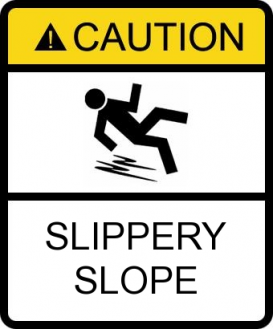
Do you recognize the two main influences that propel you to the slippery slope and undermine your eating disorder recovery?
- Anyone who supports your symptoms rather than your recovery. Be wary and alert when someone encourages you to starve or invites you to join them in a binge.
- Eating disorders distort your thinking and your perceptions. Under the influence of that distortion, you can rationalize and justify eating disorder behaviors. That justification puts you well on the slippery slope to relapse.
A vital part of your ongoing recovery work is to continually reality check so you can counter sometimes subtle dangers with what supports your eating disorder recovery. Catch yourself if you feel the urge to use name-calling or attempt to denigrate and humiliate others in order to feel good about your eating disorder choices. Those urges to ridicule someone for making a healthy choice come from a defensive stance.
Take a hard look at yourself to see where you may need to feel superior to others. The healthy choice threatens the unhealthy choice. If a person needs to elevate themselves above someone else, she's looking for a feeling of superiority and safety. This indicates slippery slope ground, much like an alcoholic will ridicule someone who chooses not to drink.
Seeking protection from an elevated place is natural, much like seeking high ground during a flood. But it doesn't constitute healing.
It could demonstrate quick-wittedness and the ability to move fast in order to escape painful reality. This is life-saving in terms of a physical flood. But if the elevation is based on justifying eating disorder choices, the person is on the verge of sliding down the slippery slope.
A vulnerable time in recovery is when you use your fine mind to trick yourself. You convince yourself that you are in the right, that you know better when you defy health-supporting behaviors that support you on your recovery path.
Slippery Slope Signals
You might convince yourself that you are healthy enough or strong enough to:
- Stop journaling
- Eat trigger foods
- Deny yourself adequate sleep
- Cancel psychotherapy appointments
- Criticize people who continue to use healing tools
- Spend time with people who act out their eating disorders or addictions.
Undermining your recovery in these ways is an inevitable stage in recovery work. Recognizing the danger and coming back to your recovery plan as soon as possible is vital. Hopefully, you won't stray too far on the slippery slope, and you will stop before you slide to the bottom.
Placing people in your life, like your therapist or a support group, who will call you on your dangerous choices can help you grow and heal your way back to your recovery. Picking up your discarded healing routines, like journaling, can bring you to a more balanced viewpoint. You can develop a sense of kindness toward yourself and others that supports your health and creates internal respect and confidence.
Safeguards
Recovery means restoring, or establishing for the first time, a healthy way of living. This includes honest self-understanding as well as respect for others. It means developing compassion and finding peaceful solutions internally and with other people to resolve stress and conflict. These are the safeguards that protect you from the slippery slope.
Eating disorder recovery can't be done in isolation based solely on your own feelings, thoughts, and experiences. The human world is much bigger than that. You can fool yourself into believing you are drawing on a broader experience than your own if you only listen to yourself. Isolation makes you vulnerable to the slippery slope.
It's essential to recognize that slippery slope voice within you and in the voices of people you hear and read. These are the voices that minimize recovery work and lure you toward eating, dieting, drinking, party binging, body shape focus, mirror shaming, constant weighing and measuring, clothing size focus, diets and more.
Recognizing the slippery slope guides and staying clear about your recovery work builds self-confidence and clear thinking. Each day you spend on firm recovery ground, you become more secure on your path to eating disorder recovery.
- What's your experience with the slippery slope?
- Have you believed people who seemed to look good to you while they encouraged your eating disorder life?
- Have you slipped down that slope?
- How did you grab hold and come back up to your recovery work?
- What advice do you have for someone who is sliding off their recovery path?
Please share your thoughts in the comment section below.
Written by Joanna Poppink, MFT. Joanna is a psychotherapist in private practice specializing in eating disorder recovery, stress, PTSD, and adult development.
She is licensed in CA, AZ, OR and FL. Author of the Book: Healing Your Hungry Heart: Recovering from Your Eating Disorder
Appointments are virtual.
For a free telephone consultation, e-mail her at
You may begin with the series introduction here.


Add comment